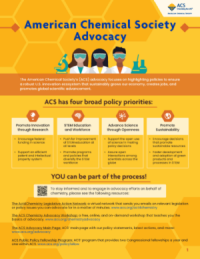Chemistry Advocacy Day
ACS and Advocacy
As one of the largest scientific organizations in the world, ACS regularly engages the Executive Branch and U.S. Congress to encourage legislation and policies that advance chemistry and STEM education. ACS advocates for strong funding for scientific research, strengthening of STEM education at all levels, sustainable chemistry practices, and much more. However, ACS cannot do it alone. It needs the voices of constituents to emphasize the importance of science, and more specifically chemistry! Find out more about ACS advocacy.
NCW Chemistry Advocacy Day – October 20, 2021
As part of National Chemistry Week 2021, ACS is encouraging chemists and chemistry enthusiasts to catalyze positive change by participating in NCW Chemistry Advocacy Day taking place October 20, 2021. Participants will engage in advocacy by contacting their members of Congress via email or phone.
You may be wondering, why on the 20th and why only one day? Evidence shows that high constituent engagement on a specific issue in one day increases visibility and the likelihood of members of Congress taking action to address that issue! ACS makes engagement easy through resources including:
- how to find your members of Congress
- scripts for your call
- links to email templates you can send in minutes
- information on the chemistry issues up for consideration in Congress now
How to Prepare
To prepare for NCW Chemistry Advocacy Day, take the next steps:
- Save Wednesday, October 20 on your calendar and revisit this page for tips on advocacy and the legislation ACS is advocating on.
- Sign up for Act4Chemistry, ACS’ legislative network, and receive periodic updates about advocacy actions you can take.
Issues
Below is a quick summary on each topic and appropriate buttons to continue your activities. You can act by clicking on the “email” or “call” button for each issue, which will take you to Act4Chemistry’s formatted email or to a suggested script for the topic.
1. Ask the Senate to confirm science nominees for key positions & consider a chemist for the Chemical Safety Board
a. In 2021, the Biden Administration nominated three chemists to three important parts of government. Dr. Geri Richmond has been nominated as the Department of Energy’s (DOE’s) Under Secretary for Science and Energy. Dr. Richmond would oversee both the Office of Science and DOE’s applied research and development programs. Dr. Asmeret Berhe has been nominated as the Director of the DOE Office of Science, which includes programs such as Basic Energy Sciences and Biological and Environmental Research. Additionally, Dr. Laurie Locascio has been nominated to lead the Department of Commerce’s National Institutes of Standards and Technology (NIST). ACS asks the Senate to vote on their nominations. ACS is also asking Congress to encourage the nomination of someone with experience and a background in chemistry for the remaining vacancy on the U.S. Chemical Safety and Hazard Investigation Board.
2. Ask Congress to include STEM priorities in wider U.S. innovation legislation package
a. ACS is encouraging the inclusion of the following bills into the wider Science and Innovation package Congress is aiming to pass. These bills create an array of programs, grants, and requirements that support a more diverse and inclusive learning environment in STEM. H.R. 204/S. 2224, The STEM Opportunities Act; H.R. 2027, the MSI STEM Achievement Act; H.R. 210, The Rural STEM Education Research Act; and H.R. 2695/S.1379, The Combating Sexual Harassment in Science Act. Clicking on the email or call button below will provide more information on each bill.
3. Ask Congress to include sustainable chemistry and helium priorities in wider U.S. innovation legislation package
a. ACS is encouraging the inclusion of dedicated support for sustainable chemistry and authorization of new helium conservation measures into the wider Science and Innovation package Congress is aiming to pass. Language supporting sustainable chemistry and the conservation of the critical material helium has passed the House. Inclusion in the final package that could become law will depend on action by scientists like you to ensure Members are aware of the importance of supporting sustainable chemistry and conserving nonrenewable helium.

Quick Advocacy Tips
Emails and calls are easy ways to connect with your lawmakers and support chemistry. Here are some tips about engaging in advocacy while having fun!
- Find your policymaker's name and contact information.
- Members of Congress want to hear from their constituents but won't pay much attention to someone else's voters.
- Policymakers and their staff like specifics.
- Identify yourself, where you are from and why you are calling/emailing.
- If you are referencing a specific bill, include the bill number (e.g., H.R. 123 or S. 456).
- It is important to describe the importance of the issue to you, your institution, community or state. Personalize it and make sure to focus on local impacts if you can.
- Clearly identify your “ask.” Clearly state what action you would like your members of Congress to take.
- If you are requesting they vote Yes or No on an upcoming vote on a bill, be direct and say so.
- If you are requesting they vote Yes or No on an upcoming vote on a bill, be direct and say so.
- If your legislator responds, follow up with a thank you note. This is important to establish a relationship with your elected officials and their staff.
- Let ACS know about your advocacy actions!
If you wish to learn more about how to advocate, sign up for the free and on-demand ACS Chemistry Advocacy Workshop. Check back on this page during NCW Chemistry Advocacy Day for legislative bills currently up for consideration in Congress along with sample call scripts and emails.


